
The Distinguished Service Order (DSO) is a military decoration of the United Kingdom, as well as formerly of other parts of the Commonwealth, awarded for operational gallantry for highly successful command and leadership during active operations, typically in actual combat. Since 1993 it has been awarded specifically for "highly successful command and leadership during active operations", with all ranks being eligible. It is a level 2A decoration (order) in the British system of military decorations.

The George Medal (GM), instituted on 24 September 1940 by King George VI, is a decoration of the United Kingdom and Commonwealth, awarded for gallantry, typically by civilians, or in circumstances where military honours are not appropriate.

The Distinguished Service Cross (DSC) is a third-level military decoration awarded for gallantry during active operations against the enemy at sea to officers; and, since 1993, ratings and other ranks of the British Armed Forces, Royal Fleet Auxiliary and the British Merchant Navy have been eligible. The award was formerly also awarded to members of armed forces of other Commonwealth countries.
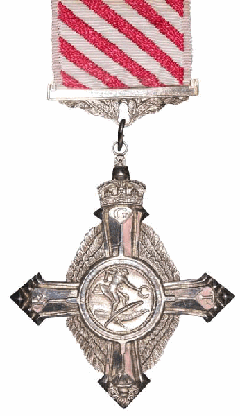
The Air Force Cross (AFC) is a military decoration awarded to officers, and since 1993 other ranks, of the British Armed Forces, and formerly also to officers of the other Commonwealth countries. It is granted for "an act or acts of exemplary gallantry while flying, though not in active operations against the enemy". A bar is added to the ribbon for holders who are awarded a further AFC.

The Military Medal (MM) was a military decoration awarded to personnel of the British Army and other arms of the armed forces, and to personnel of other Commonwealth countries, below commissioned rank, for bravery in battle on land. The award was established in 1916, with retrospective application to 1914, and was awarded to other ranks for "acts of gallantry and devotion to duty under fire". The award was discontinued in 1993, when it was replaced by the Military Cross, which was extended to all ranks, while other Commonwealth nations instituted their own award systems in the post war period.
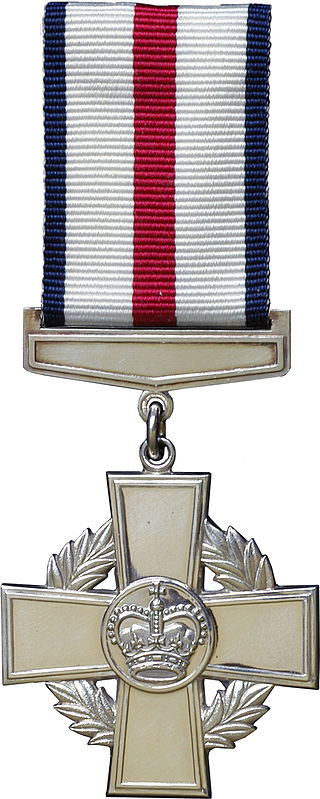
The Conspicuous Gallantry Cross (CGC) is a second level military decoration of the British Armed Forces. Created in 1993 and first awarded in 1995, it was instituted after a review of the British honours system to remove distinctions of rank in the awarding of gallantry decorations. The Victoria Cross is the only higher combat gallantry award presented by the United Kingdom.

The British Empire Medal is a British and Commonwealth award for meritorious civil or military service worthy of recognition by the Crown. The current honour was created in 1922 to replace the original medal, which had been established in 1917 as part of the Order of the British Empire.

The King's Police Medal (KPM) is awarded to police in the United Kingdom for gallantry or distinguished service. It was also formerly awarded within the wider British Empire, including Commonwealth countries, most of which now have their own honours systems. The medal was established on 7 July 1909, initially inspired by the need to recognise the gallantry of the police officers involved in the Tottenham Outrage. Renamed the King's Police and Fire Services Medal (KPFSM) in 1940, it was replaced on 19 May 1954 by the Queen's Police Medal (QPM), when a separate Queen's Fire Service Medal was also instituted. The current award was renamed the King's Police Medal following the death of Queen Elizabeth II in 2022 and the accession of King Charles III to the throne of the United Kingdom.
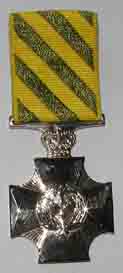
The Conspicuous Service Cross (CSC) is a decoration (medal) of the Australian honours system. It is awarded to members of the Australian Defence Force "for outstanding devotion to duty or outstanding achievement in the application of exceptional skills, judgment or dedication, in non-warlike situations". In November 2019, 1129 people were listed as recipients. All ranks are eligible for the award.

The King's Commendation for Bravery and the King's Commendation for Bravery in the Air are United Kingdom awards, open to both military personnel and civilians. They were established in 1994, when the award of the Queen's Commendation for Brave Conduct and the Queen's Commendation for Valuable Service in the Air were discontinued.

The Medal of Bravery is a decoration that is, within the Canadian system of honours, the third-highest award for bravery, and one of the three Canadian Bravery Decorations awarded by the Canadian monarch, generally through his or her viceroy-in-Council. Created in 1972, it is presented to both living and deceased individuals deemed to have performed "acts of bravery in hazardous circumstances". Recipients are allowed to use the post-nominal letters MB.
The Conspicuous Service Medal (CSM) is a military decoration awarded to personnel of the Australian Defence Force, and officers and instructors of the Australian Defence Force Cadets. It is awarded for meritorious achievement or dedication to duty in non-war like situations. The CSM was introduced in 1989 and is a distinct Australian military award. It is the second level award of the Conspicuous Service Decorations in the Australian Honours System. Recipients of the Conspicuous Service Medal are entitled to use the post-nominal letters "CSM". Since its inception 1,021 had been awarded, plus a single Bar. All ranks are eligible for the award.
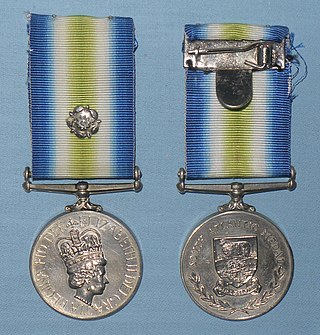
The South Atlantic Medal is a British campaign medal awarded to British military personnel and civilians for service in the Falklands War of 1982 between the United Kingdom and Argentina. Over 33,000 medals have been awarded. The South Atlantic Medal Association was formed in 1997 for recipients of the South Atlantic Medal.
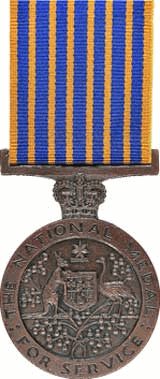
The National Medal is an Australian award given for long service by operational members of specified eligible organisations. It was introduced in 1975, as an original component of the new Australian honours system, and replaced a range of medals available to military and civilian uniformed services for long service and good conduct. The eligible groups have in common that their members serve or protect the community at the risk of death, injury or trauma, hence it is only available to members of the eligible organisations who are operationally deployed. In the case of corrective services, eligibility is restricted to officers with custodial duties.

The King's Commendation for Valuable Service is a British military award for meritorious service in an operational theatre. It was established in 1994, when the award of the Queen's Commendation for Brave Conduct and the Queen's Commendation for Valuable Service in the Air were discontinued.
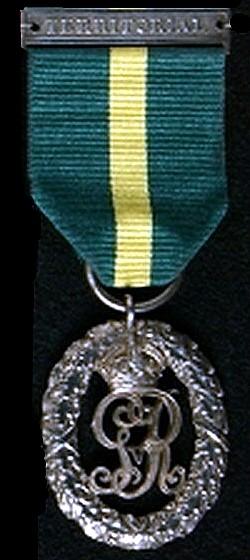
The Efficiency Decoration, post-nominal letters TD for recipients serving in the Territorial Army of the United Kingdom or ED for those serving in the Auxiliary Military Forces, was instituted in 1930 for award to part-time officers after twenty years of service as an efficient and thoroughly capable officer. The decoration superseded the Volunteer Officers' Decoration, the Colonial Auxiliary Forces Officers' Decoration and the Territorial Decoration.

The Service Medal of the Order of St John is awarded to recognise both conspicuous and long service with the Venerable Order of St John, particularly in St John Ambulance, both in the United Kingdom and in a number of other Commonwealth countries and Hong Kong. The award was announced in the St John Ambulance Brigade General Regulations for 1895 and minted in 1899, though the first honourees had been selected the previous year.
The General Campaign Star is a campaign medal created in 2004 by the Canadian monarch-in-Council to recognize members of the Canadian Armed Forces who had directly participated in any military campaign under Canadian or allied command. It is, within the Canadian system of honours, the sixth highest of the war and operational service medals.

The Common Security and Defence Policy Service Medal is an international military decoration awarded to individuals, both military and civilian, who have served with CSDP missions. Since the 1990s the European Union has taken a greater role in military missions both in Europe and abroad. These actions were taken under the Common Security and Defence Policy (CSDP), which is implemented by the European Union Military Staff, a department of the EU. To recognize service in these missions the EU authorized the creation of a medal with a common obverse and reverse, to which clasps featuring the missions' name are attached to the ribbon bar.
The orders, decorations, and medals of Malaysia comprise a complex system by which Malaysians and qualified foreigners are honoured by the country's sovereign for actions or deeds that benefit their community or the country at large. Modelled on its British predecessor, the orders, decorations, and medals of Malaysia were created after formation of Malaysia. The honour system came to exist earlier during Federation of Malaya. During the British colonial times, honours were given under the British honour system. Johor was the first state to institute its own honours on 31 July 1880. Then, the other Malay states did the same.
















